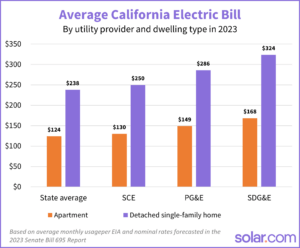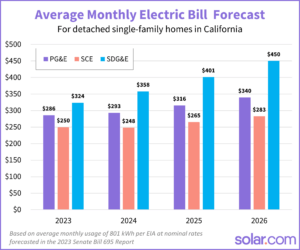You might wonder what value there really is in conducting a home energy audit and if it’s worth exploring for your home. In California, energy consumption and cost is an ongoing topic. Data reported on Solar.com shows that the average California electric bill for detached single-family homes in 2023 is $286/month or $3,432/year. Moreover, many homeowners have additional energy-related expenses, such as natural gas or oil, based on their chosen home energy sources for power generation. Not to mention the planned annual increase that has already been announced by PG&E that will take the monthly average to $357 ($4,292 annually) by 2026.

While external factors like fuel prices might be beyond our control, homeowners can significantly influence their energy use and optimize their home energy efficiency to lower utility costs. The sooner you optimize your home energy and switch to more sustainable energy solutions, the sooner you can take control of your home energy future and minimize the impact of utility rate hikes year over year. Undergoing a home energy audit or assessment is a great strategy to enhance energy efficiency and curb energy expenses.
Diving into a Home Energy Audit
A home energy audit is a comprehensive inspection of your home to gauge its energy use. The goal is to pinpoint areas of inefficiency and recommend actionable, cost-effective solutions.
Expert energy auditors, equipped with specialized tools, can identify where your home is leaking energy. They offer insights into not only conserving energy, but also tapping into renewable energy sources like wind power and geothermal energy. This helps ensure long-term savings and avert potential power disruptions to your home.
Engaging in a professional energy audit is a wise investment. These audits, depending on your home’s size and accessibility, can range from a brief 30 minutes to an extensive four hours. The auditors meticulously inspect your home, identifying energy-draining areas and recommending a suite of efficiency-boosting options.
A Glimpse into a Standard Energy Audit:
- Exterior Evaluation: Auditors start by evaluating your home’s exterior, scrutinizing elements like windows, walls, and eaves for potential energy leaks.
- Attic Inspection: If your home has an attic, the auditor will check the insulation and look for gaps where electrical lines are.
- Appliance Assessment: Key appliances like furnaces, water heaters and cooling systems come under scrutiny. Older models might be due for an energy-efficient upgrade. The auditor will also assess furnace filters and duct connections to detect potential energy losses.
While upgrading appliances has an upfront cost, the long-term savings are significant, especially with ENERGY STAR devices. Plus, many local authorities and utility providers offer financing options, rebates, and incentives for such energy-efficient upgrades.
- Blower Door Test: Most professional energy audits use a blower door test to find air leaks and measure indoor air quality. With all entry points sealed, a blower door machine then depressurizes the house. Infrared cameras then detect cold air intrusions, highlighting areas needing sealing.
- Lighting Assessment: The audit wraps up with a lighting assessment. Transitioning from traditional bulbs to LEDs or CFLs can significantly slash your electricity bills.
The audit’s outcome hinges on its depth. Some audit suggestions, like using efficient light bulbs or sealing doors, are simple. Others, like adding smart thermostats or better insulation, require more effort.
Cost and Savings of an Energy Audit
The cost of a professional energy audit varies based on the service provider and your home’s size. However, it’s worth scouting for deals as some local entities offer complimentary energy assessments. After your assessment is complete, you might also be eligible for rebates or tax credits for energy-conserving upgrades.
Even if there’s an upfront cost, the long-term savings on electricity bills make it a worthwhile investment. The U.S. Department of Energy (DOE) estimates that energy-efficient home upgrades can trim your energy bills by 5-30%.
How to Do a DIY Mini Energy Audit
While professional audits are the gold standard, homeowners can do some basic checks to enhance their home’s energy efficiency:
- Detect Drafts: Detect and seal drafty areas, especially near doors, windows, and electrical outlets.
- Examine Insulation: Check attic insulation and potential leak sources around HVAC equipment.
- Lighting Options: Opt for energy-efficient lighting options like LEDs or CFL light bulbs.
- Water Heater Adjustment: Adjust your water heater’s temperature for optimal efficiency and safety.
- Appliance Replacement: When replacing appliances, prioritize energy-efficient models like those with the ENERGY STAR label.
When is the Right Time for an Audit?
If soaring energy bills are burning a hole in your pocket, now’s the time for an audit. The quicker you enhance your home’s energy efficiency, the faster you’ll start reaping the savings.
However, consider the seasons. Homes in colder regions might benefit from energy upgrades before winter sets in. Conversely, if summer’s air conditioning spikes your energy bills, like it does in California, schedule an audit before the temperature rises.
Maximizing Home Energy Efficiency with Solar Panels and Battery Storage
For sun-soaked California homeowners, home improvements like installing solar panels and battery storage can significantly increase your home’s energy efficiency. With the Golden State’s abundant sunshine and the increasing frequency of power outages, the benefits are clear:
- Increased Energy Independence: With stored energy, homeowners aren’t solely reliant on the sun or the electricity grid. They have a reserve of power ready for use whenever needed.
- Savings on Utility Bills: By using stored energy during high-cost times, homeowners can save on rising electricity bills.
- Reliable Power Supply: During power outages, battery storage keeps homes running, ensuring comfort and peace of mind.
- Environmental Impact: Using solar energy reduces reliance on traditional electricity generation sources, which often produce greenhouse gases. This means homeowners are playing a part in combating climate change.
How Solar Plus Storage Works
Solar panels generate electricity when the sun shines. But what about nighttime or cloudy days? That’s where battery storage comes into play.
Excess electricity your solar panels produce during sunny hours is stored in the battery. Stored energy provides power when there’s no sun, so homeowners with solar and storage always have a reliable energy source. This is especially beneficial in areas with Time-of-Use (TOU) rates or demand charges, where electricity costs vary. By using stored energy during peak times, homeowners can avoid higher electricity rates, leading to further savings on utility bills.
Conclusion
In our energy-aware era, it’s crucial to know and improve your home’s energy use. A home energy audit gives deep insights into energy usage, showing ways to save and enhance efficiency. Acting on these energy insights lets California homeowners live comfortably, lower their energy bills, and support a cleaner planet. Pair an energy audit with the addition of a solar and battery storage solution to maximize your savings.
If you’re ready to change the way you power your home and start saving more with solar and battery backup, contact us today for a free customized quote.

